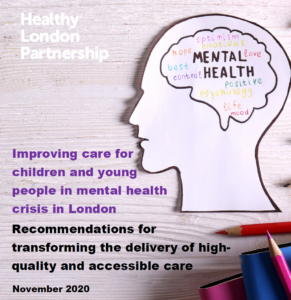As a result of the COVID-19 pandemic, many experts are warning of an increase in mental ill-health, including among CYP. In October 2020, new data revealed that one in six 5 to 16-year-olds in England have been identified as having a probable mental health disorder. This figure has increased from one in nine in 2017 and means that around four children in every classroom across London experience poor mental health. Some groups, such as looked after children and care leavers, might be more vulnerable to poor mental health.
The NHS Long Term Plan (2019) sets out the priorities for children and young people’s mental health services (CYPMHS) and this includes expanding timely and age-appropriate mental health crisis services that “will improve the experience of children and young people and reduce pressures on accident and emergency (A&E) departments, paediatric wards and ambulance services”. A mental health crisis can be as devastating and as life-threatening as a physical health emergency. Unfortunately, the care provided to CYP in London who present in mental health crisis can be fragmented, delayed, does not address their needs, and adds to their feeling of stigma – all of which can lead to a worse outcome.
In response to this, other policies published and also the COVID-19 pandemic highlighting the importance of mental health crisis care, the HLP CYP Mental Health Programme have refreshed their CYP Mental Health Crisis Guidelines.
“I am delighted that the HLP CYP Mental Health Programme has published these refreshed CYPMH guidelines. It is vital that children and young people (CYP) have prompt access to mental health crisis services. The long-term impact of failing to provide effective mental health care in childhood are well recognised. It can affect education, careers, relationships, physical health, and general quality of life. When crisis response is done well – with the engagement and support of mental health services and other local partners – it can have a positive impact on the future wellbeing of children and young people and also improve their perception of CYP Mental Health Services. I encourage CYPMH system partners to review and use these guidelines in order to support the transformation of CYPMH crisis services in London.”
Dr Ann York, Clinical Advisor for the HLP CYP Mental Health Programme
“HLP acknowledges that transforming the delivery of children and young people’s mental health has to be led locally, by professionals from across the NHS, public health, local authorities, education and other organisations, working closely with CYP and their families. In these guidelines, we signpost the work of partner agencies, including local authority children’s services and local CYPMHS, so that transformation governance groups can use them to consider the wider multi-agency response to crisis and support the provision of high-quality accessible care without stigma. It is our view that inter-agency cooperation and joint working, including co-production of services with CYP and their parents and carers, is essential to ensure that CYP receive the best possible service when they present in crisis.”
Ian Lewis, Local Authority Advisor for the HLP CYP Mental Health Programme
HLP first produced these guidelines in October 2016 to support the development of high-quality, accessible, consistent, and effective care for CYP in mental health crisis across London. It is part of a body of work by HLP that provides guidance on all aspects of crisis care. We ask Commissioners to enact our updated recommendations within their CYP Mental Health and Wellbeing Strategic Plan and within the urgent and emergency care component of their Sustainability and Transformation Plan (STP). This will help to ensure that children and young people’s mental health and wellbeing is fully supported, as set out in the NHS Long Term Plan, Five Year Forward View for Mental Health, and other implementation guidance. Urgent and Emergency Care Networks, CYP mental health providers, and other system partners should also support the design, delivery, and assurance of improved crisis care, using the voice of CYP and those who care for them.
As a summary the refreshed guidelines make the following recommendations:
1.Meet previously defined standards
2.Develop a Safety and Coping Plan
3.Provide a 24/7 service
4.Ensure effective whole system governance
5.Sign off and publish clear local guidelines
6.Provide education and training
7.Offer a designated Health Based Place of Safety
8.Use acute ward beds (paediatric and adult) as short-term inpatient facilities
9.Enact the London Mental Health Compact for CYP
10.Use efficiencies from joint working to invest in local CYPMH crisis pathways (CYPMH inpatient services Provider Collaboratives)
11.Follow Care, Education and Treatment Reviews (CETR) guidance
12.Establish a protocol with Children’s Social Care Services
13.Provide 24/7 crisis lines for all ages

